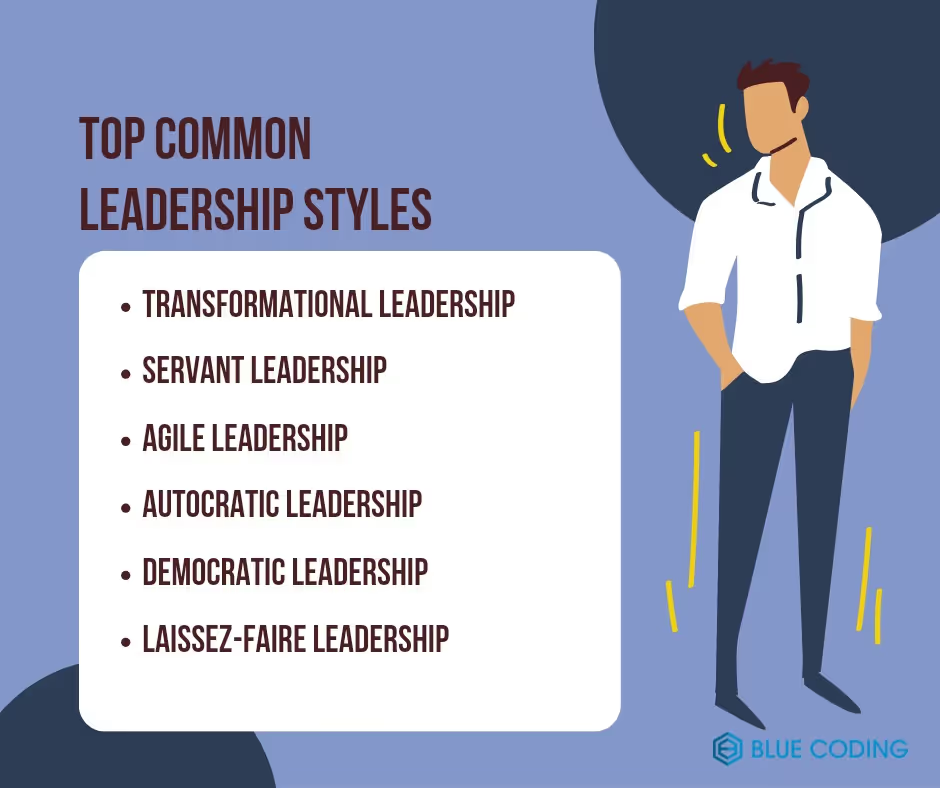Like every other teamwork, remote work teams also require the right leader in order to work productively and efficiently. In a remote setting, the absence of physical presence can make communication and collaboration more challenging. Therefore, selecting an appropriate leadership style is crucial to ensure that team members remain engaged, motivated, and aligned with their goals. In this article, we will explore the best leadership styles for remote teams that are particularly effective for them. These styles are known for helping leaders to create a productive and productive virtual work environment.

Having a leader significantly impacts remote developer teams by providing direction, motivation, and a sense of cohesion. Leaders set clear goals and expectations, which help remote developers understand their roles and responsibilities within the broader project context. Effective leaders also facilitate communication, ensuring that team members stay connected and informed despite the physical distance. This is crucial for coordinating tasks, sharing updates, and addressing any challenges that arise. Also, leaders play a vital role in fostering a positive team culture, promoting collaboration, and recognizing individual contributions. By offering support and guidance, leaders can enhance team morale and productivity, making remote developers feel valued and empowered.
In this section, we gathered Information to give you an in-depth understanding of the numerous most common leadership style practices when it comes to managing a remote development team.
Transformational leadership for remote teams is highly effective due to its focus on inspiration and motivation. Leaders who adopt this style work to create a strong vision and mission that the team can rally around. By fostering an environment of trust and enthusiasm, transformational leaders encourage developers to exceed their own expectations and innovate beyond standard requirements. This leadership style helps in maintaining high levels of engagement and morale, which are crucial when physical presence is lacking. Regular virtual meetings and consistent, transparent communication are key practices in this approach.
Servant leadership centers on the growth and well-being of team members. For remote developer teams, this style is particularly beneficial as it prioritizes the needs of the developers, helping them to perform at their best. Servant leaders act as facilitators rather than directors, providing the necessary resources, support, and autonomy to their team. This can involve ensuring developers have access to the right tools and removing any obstacles that might hinder their work. By focusing on empowering their team, servant leaders foster a collaborative and inclusive environment, which can enhance productivity and job satisfaction.
Agile remote team leadership is well-suited for remote developer teams that operate in fast-paced and dynamic environments. This style emphasizes flexibility, collaboration, and continuous improvement, aligning closely with Agile methodologies commonly used in software development. Agile leaders facilitate regular sprints and retrospectives, enabling the team to quickly adapt to changes and iteratively improve their processes and products. This leadership style encourages a culture of openness and frequent feedback, which helps remote teams stay aligned and responsive to evolving project demands.
Autocratic remote team leadership might seem counterintuitive for remote teams, but in certain scenarios, it can be effective. This style involves making decisions unilaterally and expecting compliance from team members. For remote developer teams working on high-stakes or tightly regulated projects, a clear, top-down approach can provide the necessary structure and direction to meet critical deadlines. However, it is essential to balance this style with clear communication to avoid feelings of disconnection or resentment among team members. Regular check-ins and a transparent decision-making process can mitigate potential downsides.
Democratic leadership, or participative leadership, is highly effective for remote developer teams as it involves team members in the decision-making process. This style fosters a sense of ownership and accountability, which can lead to higher levels of commitment and creativity. By actively seeking input and feedback from developers, leaders can leverage diverse perspectives to make well-informed decisions. Regular virtual brainstorming sessions and collaborative tools such as shared documents and discussion forums can facilitate this inclusive approach, helping to build a cohesive and motivated remote team.
Laissez-faire leadership provides remote developer teams with a high degree of autonomy and freedom. Leaders adopting this style trust their team members to manage their work and make decisions independently. This approach is particularly effective when the team consists of highly skilled and self-motivated developers who require minimal supervision. However, leaders must remain available to provide support and guidance when needed. Establishing clear goals and expectations upfront, along with periodic check-ins, ensures that the team stays aligned with the broader organizational objectives while enjoying the freedom to innovate and perform optimally.
What if we tell you that you can have the best remote developer team working for you whilst not having to handle any of the aspects of hiring or managing a remote developer team? It's true! Here at Blue Coding, we connect our clients with the best developers in the LATAM region. We provide software solutions such as custom software development, nearshore outsourcing, and more. To know more about these services, contact us now and book a free discovery call!
Subscribe to our blog and get the latest articles, insights, and industry updates delivered straight to your inbox